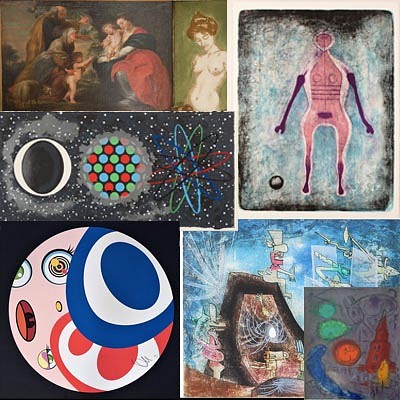Hundertwasser, Friedensreich, Austrian (1928-2000)
Lot 202
About Auction
By Creighton-Davis Gallery
Apr 6, 2024 - Apr 28, 2024
Set Reminder
2024-04-06 03:00:00
2024-04-28 20:00:00
America/New_York
Bidsquare
Bidsquare : Fine and Decorative Lottery Style Auction
https://www.bidsquare.com/auctions/creighton-davis/fine-and-decorative-lottery-style-auction-15391
Special lottery style auction. All starting prices at $100. Over 50% of the auction can be bought at the starting price. Creighton-Davis Gallery john.rareart@gmail.com
Special lottery style auction. All starting prices at $100. Over 50% of the auction can be bought at the starting price. Creighton-Davis Gallery john.rareart@gmail.com
- Lot Description
- Title: "Good Morning City, Bleeding Town" , K-41
- Medium:screenprint in colors with metal imprints, on Fabriano paper
- signed in ink, dated and numbered 7752 of 10,000
- Publisher-Year: with the stamp of the publisher/printer, Ars Viva, Zurich/Studio Quattro, Campalto-Venice
1969 - Size: ,sheet: 33 1/4 by 21 7/8 in. (73 x 55 cm.) , See Provenance for Additional Information
In Fine fresh condition., Sold unframed in acid free conservation mats and mounts.Condition
- Provenance
Reference: As recorded and illustrated in the standard text on the original graphics of the artist by Koschatzky No. 41.
Provenance: The total edition of HWG 41 and 42 was 10,000 subdivided into three subeditions:HWG 41a (initial edition) 6,400HWG 41b (initial edition) 1,600HWG 42 (phosphorescent edition) 2,000.Variants:HWG 42:2000 prints in 10 colour variants of 200 each:A-F-K-P-U-AA-FF-KK-PP-UU.Each series of 200 impressions was again subdivided into 4 metal-colour variants of 50 each:1-50 green,51-100 blue,101-150 red,151-200 gold(40 different variants)
Note: The total edition of HWG 41 and 42 was 10,000 subdivided into three subeditions:HWG 41a (initial edition) 6,400HWG 41b (initial edition) 1,600HWG 42 (phosphorescent edition) 2,000.Variants:HWG 42:2000 prints in 10 colour variants of 200 each:A-F-K-P-U-AA-FF-KK-PP-UU.Each series of 200 impressions was again subdivided into 4 metal-colour variants of 50 each:1-50 green,51-100 blue,101-150 red,151-200 gold(40 different variants).
Hundertwasser's comment on the work:
"I took up the bleeding-building motif 18 years later (after an initial work) and made a print of 10,000 copies, in 80 variations differing markedly in colour and form. I further developed the differentiation of dwellings in the storeys of the skyscrapers. The walls are not straight, but individually formed. I can readily imagine that living far from the ground, which is lethal in the long run, can be mitigated by human creativity. But where there is none, man in high-rises, so far away from Mother Earth, cannot survive.(from: Hundertwasser Architecture, Cologne, 1997, p. 24)This is my first large print edition, which I numbered from beginning to end; but actually it isn't one, since it consists of many variations. It is based on 151 Bleeding Houses. I spent months in the print shop in Campalto, while the Regentag lay in berth not far away, in a canal of the lagoon near Ca' Noghera. It was like a simultaneous chess match with more than forty opponents. I did this even more radically later with the silkscreen print 860 Homo Humus come va. I don't think anyone can outdo me in this gigantic enterprise, which took up two years of my life. I used completely new techniques in print graphics: metallic-stamp printing, phosphorescent colours that glow in the dark, reflecting glass-bead appliqu s, convex embossing and an incredible number of colour overprints which I painted separately on transparent foil, from where they were transferred to the screen. Then the proofs of the infinite number of colour combinations. I wanted to reduce the conveyor belt to absurdity. I got myself into a bind between the incredible demand which had materialised and my pride in creating something original, not mass-produced, and I wanted to give as much of my inner self as I could. I went to court and won because I wanted to keep the prices low (just like with the Art Club portfolio of 1951) - 100 marks per print, to make it accessible to many people. It was all for nought. I could not fix the price on the open market. It was a victory and a defeat all in one. (from: Hundertwasser 1928-2000, Catalogue Raisonn , Vol. 2, Taschen, Cologne, 2002, pp. 812-813) - Shipping Info
-
Please note that shipping is the responsibility of the buyer. Creighton-Davis will attempt to facilitate shipping whenever possible. However some items require specialized crating and shipping procedures which may only be offered by outside vendors.
-
- Buyer's Premium



 EUR
EUR CAD
CAD AUD
AUD GBP
GBP MXN
MXN HKD
HKD CNY
CNY MYR
MYR SEK
SEK SGD
SGD CHF
CHF THB
THB





